Peter MALONE
Saturday, 18 September 2021 19:55
German Doctor, The/ Wolkodia
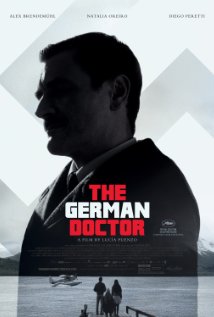
THE GERMAN DOCTOR/ WOLKODIA
Argentina, 2013, 93 minutes, Colour.
Alex Brendemuhl, Natalia Oreiro, Diego Peretti, Elena Roger, Florencia Bado.
Directed by Lucia Puenzo.
The German Doctor was directed by Lucia Puenzo who has made a number of short films, as well as XXY and The Fish Girl. She is the daughter of director Luis Puenzo, who made The Official Story, Old Gringo and The Plague.
This is a story from Argentina with Nazi doctor, arch-criminal, Josef Mengele and his escape to Argentina after the war and his living concealed there for several decades. The screenplay postulates his being in Patagonia, becoming friendly with a family, living in their hotel, continuing to do his experiments, on the little girl of the family, on one of the twins born during his time there.
The important thing is that he seems a sympathetic character, friendly, the little girl liking him, the family inviting him to stay in the hotel. He also continues with his studies and his experiments – becoming more and more sinister as he treats the little girl for increase in her height and treats the twins, making one the measure of improvement of the other.
The family is presented sympathetically, travelling to open her hotel, their customers, sending their children to school, the German school where they are not liked, with the German National Anthem being sung – the next generation of the escaped Nazis.
It is also the time of the taking of Adolf Eichmann, increased Israeli interest in Latin America, an agent tracking Mengele.
However, he escapes and continues his life in Latin America for almost two more decades, it seems that he died in 1979. (Of interest, the movie, The Boys from Brazil, a speculative story by Ira Levin has Mengele still functioning in Latin America, trying to make young boys clones of Hitler and the Nazis, while he is pursued by the Simon Wiesenthal character, led by Laurence Olivier.)
1. Audience knowledge of Joseph Mengele, interest in him, his work for the Nazis, his escape to South America, his continuing his career there?
2. Mengele as a doctor, his experiments, his notes, inhumanity? Scientific knowledge, working with twins, working with one as a base for investigations for the life of the other? His continuing this work in Argentina, the families, with children, incognito?
3. The setting in the 1960s, Patagonia, the landscapes, desert and mountains, the lake? The homes and huts? The hotel, lavish? The musical score?
4. Argentina by 1960, the Nazis who migrated there, cover-ups, protection? The continuing their lives?
5. The opening with Eva, Enzo, Lilith and the rest of the family? Their moving to the town, packing up? The encounter with the German, his friendliness, talking with Lilith, playing with the doll? His following the family as they drove through Patagonia? His going into the town?
6. The family, characters, Enzo and his work with the dolls? Eva and her pregnancy? Opening up the hotel? Lilith, her age, short height? The German and his interest in Lilith, experiments, diagrams, documents, increasing her height over a short time? His interest in Eva and her pregnancy? His moving into the hotel and living there? His seeming pleasantness? The fact that Mengele himself was able to conceal himself and mingle with people for so long?
7. The theme of the dolls, Lilith and her doll, its name and the title of the film, needing a heart, the German repairing it? Her father and his work with the dolls, the commissions?
8. The children going to the school, their not being liked, understanding German but not speaking it? The singing of the German national anthem? The Nazis escaping to Argentina, the next generation? The staff?
9. Nora, her investigations, Israeli background, getting information and communicating it? The meetings with the German, and his suspicions? Examination of his documents? His threatening her? Her being murdered?
10. Lilith, growing up, liking the German, wary? Her brother, the other members of the family? Enzo and his growing suspicions?
11. The birth of the twins, the doctor and his interventions, experiments with the twins, one improving, the other not? The effect on Inso?
12. The German, his allies, the flying boats, the warnings, his escape?
13. The final information about Mengele and his eventually being arrested in Brazil?
Published in Movie Reviews
Published in
Movie Reviews
Tagged under
Saturday, 18 September 2021 19:55
Max and Helen
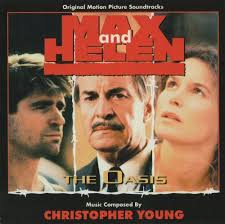
MAX AND HELEN
US, 1990, 100 minutes, Colour.
Treat Williams, Alice Kriege, Martin Landau, Jonny Phillips, Johdy May.
Directed by Philip Saville.
Max and Helen is based on a novel by Nazi-hunter, Simon Wiesenthal, here played by a rather intense Martin Landau.
Information comes to hand that the manager of a German factory in the early 1960s is a neo-Nazi, brutal to his staff. Wiesenthal gets his staff to take photos and finds a link with Doctor Max Rosenberg living in Paris. Doctor Rosenberg is unwilling to talk, but is visited by Wiesenthal and eventually opens up and tells his story, beginning in the 1930s.
Rosenberg studied medicine, was engaged to a young woman, his father wanted him to marry her and take her to Paris where he was studying, but, on principle, he refused. After the invasion of Poland, the Jews are rounded up and Max and Helen’s family are taken to a concentration camp on the road to Kiev where they are part of a road gang to build highway for the troops. The camp is managed as a work base with a new commandant, Werner Schultz, played by Jonny Phillips, it turns into prison and a harsh concentration camp, the commandant himself taking prisoners to his room at night, playing music and beating them almost to death. The men and women are separated but the Commandant discovers that Max knows medicine and he is made the doctor of the camp.
A group plan an escape, Helen says she cannot go because she has promised their mother to look after her frail sister in the camp. Max joins the partisans, is freed, but, after the war, is accused of being pro-Nazi and sentenced to 10 years in Siberia. After his release, he continues his search for Helen.
The screenplay keeps the audience in suspense to late in the film as to whether Max finds Helen or not. He does, and discovers that she was raped by Schultz and that she has a son who resembles him closely but has brought him up as Jewish.
Max refuses to testify against the owner of the factory as does Helen who wants to protect her son. Wiesenthal, at the end of the film, burns the documentation.
Treat Williams and Alice Kriege are sympathetic in their portrayals of Max and Helen.
1. The film based on a story by Simon Wiesenthal and his tracking down Nazis over so many decades. This story is one of his novels?
2. The film made in 1990, the events happening in 1960s, remembering the 1930s and 40s?
3. Paris locations, apartments, the streets? Wiesenthal’s office? German locations? The pre—war years in Poland, the walk, the taking of the Jews, the concentration camp, Ukraine? The aftermath of the war, Max and his visits to Poland, Germany?
4. Wiesenthal, his staff, their resources, documentation, his tracking down information? The situation for the film, the factory, the manager, his Nazi statements, brutalising his staff? A candidate for Wiesenthal’s hunting?
5. Max Rosenberg, his age, experience, doctor, not wanting to be interviewed, his refusals while walking away from Wiesenthal? His coming to the hotel, the long night and his recounting his story, the insertion of the flashbacks? The effect on him having told the story after so many decades?
6. Max and his story, the Polish town, Helen and her family, the parents, the fragile sister? Max and his being asked to marry Helen, his refusal? The family’s being rounded up? The trains, going to Ukraine, the concentration camp, the hard work, building the highway? A more genial regime, the men not separated from the women, Helen able to look after her sister?
7. Schultz, his harshness, his cane, the parades, his ridiculing people? Seeing that Max had medical skills, making him the doctor? His treatment of people, the man with a wounded hand and his being beaten, the representative of the Jews and his being beaten and killed? The hard labour, the guards, some sympathetic? Max and his meeting with Helen?
8. The plan for the escape, Max discussing with Helen, her refusing, staying to look after her sister? The escape, with the partisans? The Polish authorities, the hearing, condemning Max to Siberia, using evidence against him? 10 years in Siberia, his being released, the visit to Austria, seeking asylum and becoming a citizen?
9. His search for Helen, the documents, visiting the town, Wanda and the memories of the past, her information about having a card? Max going to Germany, finding Helen’s house? The shock when the young man opened the door, and the same actor who portrayed Schultz?
10. Helen’s story, the rape, holding her sister’s health over her? the rape, the attack on the camp? Helen’s escape, pregnant? The birth, her son, love, bringing him up as Jewish, his wanting to help Wiesenthal, her secrets?
11. Max, trying to accept the situation, having to leave? Wiesenthal coming, Helen pleading with him not to harm her son? The debt to the dead? The debt to the living?
12. A year, Max’s return, a future? Wiesenthal destroying the documents?
Published in Movie Reviews
Published in
Movie Reviews
Tagged under
Saturday, 18 September 2021 19:55
Walking Hills, The
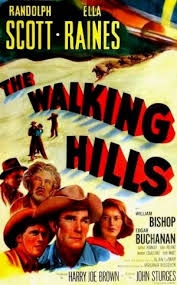
THE WALKING HILLS
US, 1949, 78 minutes, Black and white.
Randolph Scott, Ella Raines, William Bishop, Edgar Buchanan, Arthur Kennedy, John Ireland, Jerome Courtland, Josh White.
Directed by John Sturges.
In 1948, John Huston made The Treasure of the Sierra Madre. In 1949, there was a drama with Glenn Ford and Ida Lupino, Lust for Gold. 1949 also saw this film, again a drama about searching for gold.
The title refers to the sand dunes in Death Valley and their continuing shifting with the winds. A young man says that he saw signs of wagons in the dunes and members of the card game decide that they will secretly go out to search for wagons that were carrying gold lost in the 19th century.
The group is led by Randolph Scott, appearing in what could be called a contemporary western rather than period films, of which made several in 1949. Ella Raines plays his former girlfriend, works in the town and sees a season of the boyfriend, Dave, William Bishop, who is being pursued by a detective, John Ireland. Also in the group is Arthur Kennedy as well as Josh White, the blues singer who has several songs during the film.
The film shows the struggle to find the gold under the sand, the struggles amongst the group themselves, the fact of the detective and the young man who thinks he is being pursued as well is the older man who is actually being pursued.
The main feature of the film is the fierce sandstorm which runs for several minutes, spectacular in its way, involving the audience in the difficulties of the gold seekers.
The film is one of the earliest from director John Sturges who, after a number of short films, made Bad Day at Black Rock and then went on to significant westerns like The Gunfight at the OK Corral and, then, The Magnificent Seven.
1. A contemporary western of the 1940s? The Mexican- American border? The film shot in Death Valley? Streets, shops, hotels, card games? The scene moving out into the border desert, the sand dunes, the search for gold, difficulties with the horses, the sandstorm? Musical score?
2. The title, describing the hills and the wind blowing them into different shapes, burying all traces?
3. The opening, the detective, talking with the man who commissioned him, trying to ignore him – and the later interventions as he used mirror and sun to convey messages? The arrival of Dave, looking in the window at Christie, the response, his going through the Mexican border? The card game? His becoming involved?
4. The members of the game, Jim and his leadership, Josh and his singing? The other men, Johnny and his telling the story, the old man and his memories, telling the story of the lost gold?
5. The decision to go, immediately, secretly, packing up, finding the site, Christy and her joining them?
6. The men amongst themselves, suspicions, arguments, work, Sentry?
7. The detective, his antagonism, signalling his employer, the clashes and fights, the fight with Johnny, Johnny and his injuries, the decision not to go for a doctor? His talking to Jim, thinking he was being pursued, not wanting any help? His death?
8. Dave, working, the flashbacks of his story, the card game, the shooting? His escape? Pursued? Love for Christy? Involved in the digging, the clashes? His finally going to surrender himself?
9. Christie, tough, rodeo riding, with Jim, their break, with Dave, talking with him? Pleading for Johnny and the doctor? The horses?
10. The Indian, with the horses, waiting for Jim’s signal?
11. The wind storm, the sand, everyone trying to cope, the horses? The impact of the storm scene?
12. The aftermath, the old man and his lies, finding a bag of money, Dave giving himself up, the detective going back to work, Jim and Christie going back to
town?
13. A variation on the lust for gold?
Published in Movie Reviews
Published in
Movie Reviews
Tagged under
Saturday, 18 September 2021 19:55
Thin Red Line, The/ 1998

THE THIN RED LINE
US, 1998, 170 minutes, Colour.
Nick Nolte, Sean Penn, Jim Caviezel, Elias Koteas, Ben Chaplin, Dash Mihok, John Cusack, Adrien Brody, John C.Reilly,John Savage, Woody Harrelson, Miranda Otto, Jared Leto, John Travolta, George Clooney, Nick Stahl, Thomas Jane, Simon Lyndon, Dan Wylie, Mark Boone Jr.
Directed by Terrence Malick.
Why in 1998 should two Hollywood blockbusters and Oscar nominees dramatise for us key battles of more than fifty years ago: D-Day? and its aftermath, shown with extraordinary realism in 'Saving Private Ryan' and the battle of Guadalcanal halting the advance of the Japanese in the Pacific towards Australia in 'The Thin Red Line'?
While 'The Thin Red Line' has enough battle realism and combat intensity (the laborious taking of a peak in the Solomons) to put it amongst the classics of war, Terrence Malick's adaptation of James Jones' novel, is interested in the meaning of the battle for those engaged in it. Jones also wrote 'From Here to Eternity' and his own story was told in the Merchant Ivory film, 'A Soldier's Daughter Never Cries'. And Malick is famous for having made 'Badlands' and 'Days of Glory' in the 70s and now this film after 20 years.
Whereas Spielberg opens with the peace of the present in a war cemetery and then takes us back, Malick shows us the idyllic Pacific where no war should be. But it comes, testing islander and American alike. With its inner voices technique, the film invites us sometimes to contemplate, sometimes to reflect, always to listen to what these men are saying. Sometimes, as with Nick Nolte's character, the voice contradicts the action. There are voices of idealism (and idealising the absent, far-off woman), cynical voices, voices that speak of life and death and the experience of death.
While there are some star cameos, it is the less known actors, especially Elias Koteas as the platoon leader, who are the core of the film. The battle, lasting for almost two and a half hours of the film was enough war which meant that the final confrontations tended to be anti-climax. However, visually the film is a great achievement. It shows us the realities of war with great power. But it also makes a sincere attempt to invite its audience to share with its protagonists the terror, the mystery of life and of dying.
1. The tradition of World War II films? War in the Pacific? the films during the war, immediately after, 40 years later?
2. James Jones and his novels, the narratives, the small group, the paradise setting in the Pacific, the intrusion of war? The convoys, attacking the island, the mountain, the entrenched Japanese? The film showing an awareness of a range of attitudes and behaviour towards and in war?
3. The opening, the setting, lyrical, the beauty of nature, the sea and the hills, the jungle? The two men AWOL, enjoying that life, with the local people, participation, games? Witt and his reflection on the war and his own life? His memories of home?
4. The musical score, the variety of moods and responses?
5. The title, blood, defence, between enemies?
6. The work of the director, his first film in 20 years, subsequent career? The strength of his cast?
7. The structure: the introduction, idyllic, Melanesia, the village and children, nature, crocodile, birds, vegetation? Witt and his friend, AWOL, the intrusion of the soldiers, the convoy, the interludes? The flashbacks and voice-overs? Lyrical beauty, the Solomon Islands, the women and children, the men, play? Career? Wit and his voice-over, the flashbacks to his mother, death? Themes of death and mortality?
8. The difference voice-overs, Witt and his earnestness and naivete, Tall and his ambitions, doubts, hopes? The interactions? Bell, love for his wife, the flashbacks, support and loss, divorce? Captain and his reflections?
9. The flashbacks, Bell, with his wife, love, lyrical, the different angles, no words, the swing in love, infidelity, the letter, divorce yet the experiencing of sharing?
10. Guadalcanal, the map, the plan, the Japanese airfield, getting control of it? The turning of the war? Hard fought, hard won, the achievement?
11. The character of Witt? The discussions with Welsh? Welsh and his criticisms? Witt and his seeming to be fearless? His sense of self? Threat of prison? His action in the war?
12. The ship, the officers, the discussions, Tall and his voice-over, the contrast with his action? The Colonel, active service, the discussion of the maturity of the men? The theme of someone always watching? The prospect of the future, the world, the sons and grandsons, the morale boosting? Themes of sacrifice? The closer to Caesar, the greater the year?
13. The scared, father, chicken hoops? Hopes and fears? The religious attitudes of some of the men, prayer?The calm, anger, guns?
14. The Captain and his role, a lawyer in a previous life, his being with his men?
15. The character of Bell, as a soldier, engineer, his wife, his resigning, drafted again, without commission? The impact of the flashbacks, his wife, his wife and the other side of war?
16. Going into action, the discussions between the Captain and Tall? The barges, the water, the landing, the soldier and officer at breaking point? His sense of responsibility, his later involvement and muttering to himself? The landing, running, the plane, the natives and the machetes, the progress, the swamps? And yet the beauty, the parrots?
17. The audience’s sense of being there on the island? Participating in the landing, the men, the trucks going up and down, the wounded, the medics, Witt and his help? The soldier without legs?
18. Tall, Welsh, the Captain, the plans? Looking towards the Japanese, the Japanese and the slits for the guns? The Captain praying, not to betray his men, lighting the candle?
19. Tall, the bombing, the morale of the troops, the pursuit of the Japanese? The soldier to lead the group, running, sickness and fear, the shooting, the wound to his buttocks? The running up the hill, vivid, the visuals, crying? The Captain and his arguments, the decisions? Tall and outcomes, wanting to boost the troops, the Captain and his stances?
20. The close-ups of the men on the hill, shot, dying, Welsh and his brave rescue, not wanting the medal? The need for water? The men supporting the Captain?
21. Tall and the Captain, the patrol, the reconnaissance, the Captain refusing Tall’s orders? The to-ing and fro-ing? Tall and wanting things to his way? The young men dying?
22. Bell, the small group, going up the hill, their success? And the interludes in the flashbacks?
23. Tall, the issue of lack of water, not wanting to lose? Witt and Welsh and discussing the effect of one man dying, for nothing?
24. John, leading the group up the hill, the rock cover, phoning the information, the fierce fighting, the weapons, continuing up, the deaths, the Japanese trapped?
25. Overrunning the camp, grenades, the Japanese running, Japanese nest and grenades, the anger of the men, the brutality towards the Japanese?
26. Tall, John, the talk of medals? John on the Japanese prisoners, staring out Tall, the demand for the water? Tall not waiting for the water, just letting the men passout? His declaration that there was new spirit in the men? The fact that he waited all his life and his triumph, his past and being passed over, John staring at him, Tall calling him him his son?
27. Fife, the voice-over, pensive, the dead Japanese? The clash, the bayoneting on both sides, fleeing? Pursuit? The Japanese charge, in desperation, shooting no matter what? The Japanese trying to surrender? The close-ups? John and his kind approach? Staying with the dying Japanese? The carrion birds?
28. The confrontation between Tall and the Captain, the Captain relieved of his command, Tall saying the Captain was too soft? The reassignment? Star and Purple Heart? The Captain and his joy in leaving, the soldiers praising him, their being like his sons?
29. The aftermath of the taking of the mountain, going down, the men swimming? The comment that war does not ennoble, turns men into dogs, poisoning of the soul?
30. Bell’s contemplation, memories of his wife, her watching the sea, on the swing, talking about her love, wanting a divorce, finding someone new, talking about the time she had spent with him and his understanding this?
31. Comments on war, the wrong spot, the wrong time, getting to feel nothing, caring about nothing – Witt and his not caring and Welsh saying that the sound like bliss?
32. The men relaxed, the returning, the hostile boy and his changed towards Witt? Witt and Bell watching?
33. Pursuing the Japanese, Witt and his volunteering, the waiting, the attack, the water, Japanese in the jungle, Fife, the line being cut, Witt intervening? The
owls and the flying foxes? Witt deciding to stay, the Japanese advance, his being surrounded, his death, Welsh and his kneeling beside his dead body?
34. The officer, George Clooney, talking about the troops as family? The soldier finding something that he owns, making an island for himself? The cemetery scene?
35. The effect of the mission – and the further aspect of war?
Published in Movie Reviews
Published in
Movie Reviews
Tagged under
Saturday, 18 September 2021 19:55
Heavyweights
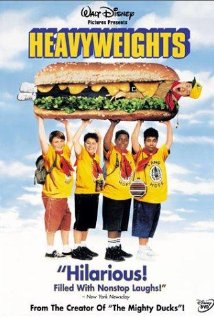
HEAVYWEIGHTS
US, 1995, 100 minutes, Colour.
Ben Stiller, Tom Mc Gowan, Aaron Schwartz, Shaun Weiss, Tom Hodges, Paul Fieg, Tim Blake Nelson, Alan Covert, Jeffrey Tambor, Anne Meara, Jerry Stiller.
Directed by Stephen Brill.
Heavyweights is a star vehicle for Ben Stiller who was emerging as an actor, television personality, comedian, as well as director in the mid 90s. This is a Disney film, a reassuring comedy for boys who are overweight.
Aaron Schwartz portrays Gerry, an overweight boy who listens to a pitch for Camp Hope, by Tim Blake Nelson, and is persuaded to go, to the relief of his parents, including father, Jeffrey Tambor. The owners of the camp are played by Ben Stiller’s parents, Anne Meara and Jerry Stiller. The cheery supervisor for the boys is played by Tom Mc Gowan.
The boys make friends on the bus, go into the hall, cheer the owners only to find that they have gone into bankruptcy and the character taking over the camp is a mad fitness instructor, played by Stiller himself (who, at the end, gets a chance to play his entrepreneur father). He enlists the help of stern supervisors, in contrast to the friendly types who are already there.
Much of the comedy comes from the attempts, especially of Stiller himself and one of his henchman, Lars, played by Tom Hodge, enforcing the boys into fitness exercises – and discovering the hidden stash of sweets and candy. There is a girls’ camp close by with the girl is not interested until the staff start to dance, the boys got the floor, the girls are happy until the owner suddenly stops everything.
Eventually, the boys rise up against this harsh regime and imprison the owner – but, after tempting his guard by some candy, he gets out and confronts the boys and their parents who are visiting.
Needless to say, all ends well, parents and sons reconciled, the only taken away by this more genial father, the good staff retained, the boys doing their bit about weight loss – but not fanatical!
The film is the kind of Disney film popular during Yuri the 1990s, akin to the series of The Mighty Ducks in which the two central young performers appeared. We see Ben Stiller at this stage of his career, about to embark on a wide range of zany comedies.
The film was directed by Stephen Brill, who collaborated in writing and direction with some of Adam Sandler’s films, especially Little Nicky. And, surprisingly, the co-writer of the screenplay is Jud Appatow who, 10 years later, after success in television, broke into the film world with The 40 Year Old Virgin and many other comedies.
Published in Movie Reviews
Published in
Movie Reviews
Tagged under
Saturday, 18 September 2021 19:55
Omar Killed Me
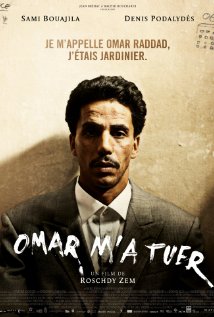
OMAR KILLED ME/OMAR M'A TUER
France, 2011, 85 minutes, Colour.
Sami Bouajila, Denis Podalydes.
Directed by Roschdy Zem.
Omar Killed Me is based on a true story, the story of a gardener from Morocco who had been in the South of France for six years and who is accused of murdering a local woman. One of the key pieces of evidence was that she had allegedly crawled and written on the wall of the basement in her blood, Omar Killed Me – the grammar was incorrect (tuer instead of tue).
Omar himself was the gardener, in France for six years, bonding with his parents, with wife and children, happy in his work, spoken well off by the neighbours. With the writing on the wall, Omar was initially convicted and sentenced to prison. However, his lawyer likened the situation to the Dreyfus case and the prejudice against North African migrants. The judges were harsh in their decisions – as they were much later when further appeals were made.
The film moves between the events of 1991 when the crime was committed and 1994 and later with Omar in jail and finally released. While the portrait of Omar is sympathetic, there is also a portrait of an established author, interested in justice, who decides that he should write a book about Omar and his case, something similar to Truman Capote and In Cold Blood. The author investigates, makes interviews, pointing out the holes in the evidence against Omar. While there is a modification in his sentence, Omar is not declared innocent and his case is ongoing.
Sami Bouajila is very good in the central role, rather stoic in his innocence, considering the impositions on him and Dennis Polydades is the author. The film was co-written and directed by prominent French actor, Roschdy Zem.
1. The film based on a true story? The accused in jail seven years? The French courts not allowing him to make the DNA comparison and appeal?
2. France in the 1990s, workers from North African countries, prejudice, presumptions against them?
3. The structure of the film, the crime and defence and trial in 1991, Omar in prison in 1994 and subsequent years?
4. The South of France, Nice, Toulon, homes, gardens, the streets, the courts, jail? Authentic atmosphere?
5. The title, the victim writing on the wall, in blood, in the dark, the poor grammar? Omar not being able to read or write? His innocence? His being framed – even to bad grammar? The irony that he could not write?
6. Omar, from Morocco, his bond with his father, his mother and visits to Morocco? His not being educated? In France, working in gardens, his love of gardens? His attitude towards the murdered woman? Considering her as a mother? His gambling habit, seeing him in the casinos, the slot machines, his losing? His motivation for his robbing the woman?
7. At home, wife and children, his parents, his community? The arrest, his mother and wife upset? In the car, at the police station, the harsh interrogations, presumptions of guilt?
8. The scenes in the courtroom, his needing a translator, the accusations, his family in court? The role of his defence counsel? With passion? His being found guilty, the sentence?
9. Omar going to jail, the procedures, going to his cell, the other men, watching the television and his court case, the noise during the night and his being disturbed? Seven years in jail?
10. The occupation in jail, his building the boat and his son, the family visits?
11. The author, his novels, his interest in the case, passion about justice, discussions with his family, their wanting him to be calm, discussions with his publisher? The decision to write the book? The comparison with Truman Capote in In Cold Blood? His being authorised to investigate?
12. His evidence, holes in the case against Omar, the different times, the neighbours, testifying in favour of Omar? The criticisms of the murdered woman and her personality? Mean, money?
13. His assistant, the hotel room, her work? The interrogations, going to the family apartment, interview with the family, interview with the maid, pretending to be from a magazine, her own behaviour, boyfriend? Her lies? Building up a case for innocence?
14. The discussions with the lawyer, his help? The discussions with Omar himself? The writing of the book, its publication? Omar with a copy, but finding it too difficult to read?
15. The appeals, the modification of the sentence? Omar coming out after seven years? Diffident, the effect of the seven years, meeting the press? At home, the neighbours putting on the party, giving the boat to his son, his weeping?
16. His meeting again with the prosecutors, the issues of DNA, their harsh attitudes? His plea? The author and his making advances? The lawyer and his continued passion?
17. The film and its making a case for Omar? The parallels with the Dreyfus case? The case still in abeyance at the time of the making of the film?
Published in Movie Reviews
Published in
Movie Reviews
Tagged under
Saturday, 18 September 2021 19:55
Wooden Horse, The
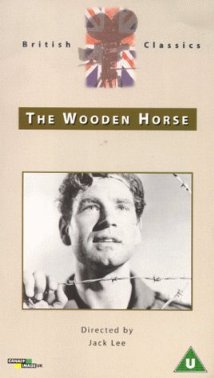
THE WOODEN HORSE
UK, 1950, 100 minutes, black and white.
Leo Genn, Anthony Steel, David Tomlinson, David Greene, Peter Burton, Michael Goodliffe, Anthony Dawson, Bryan Forbes, Peter Finch, Bill Travers.
Directed by Jack Lee.
The Wooden Horse is from a screenplay by the writer of the original book, Eric Williams. The film serves as a memoir of British prisoners of war in the German camps as well as a tribute to their enterprise.
The film shows the picture of the concentration camp, seven years after the events portrayed. Later British films, including The Colditz Story, made the picture of the camps more familiar to world audiences.
Leo Genn leads a number of British actors, some at the beginning of their successful careers, including cameo by Peter Finch as an Australian prisoner. The focus is also on Anthony Steel and David Tomlinson as the two men who escaped with Leo Genn.
The first part of the film shows the building of the horse, the men doing the exercise, the digging of the tunnel and the disposal of the sand. The second part of the film shows the three in their escape, train rides, difficulties with language, finding accommodation, tracking down Swedish sailors for passage to Sweden, the help of the French, the final voyage through Denmark and success.
1. A film of its time? The perennial interest? Troops, capture, prisoner of war camps, desire for escape? The Commandants and guards?
2. The memory of the war, this film only seven years after the events? The spirit of these films in post-war England? Tributes? Morale-boosting?
3. The strong British cast, many on the verge of their significant careers?
4. The picture of the camp, the grounds, the wires, the guard towers? The prisoners, bunks, showers, washing? The parades?
5. The men, officers and privates, together in the camp, the official British leader, the committee for examining escape plans? Collaboration amongst the men? The attempts to escape, some being found out, the roof collapsing with the dirt?
6. The idea of the wooden horse, getting material, building, permissions, letting the Germans see that it was empty, including the polls for lifting, the bags for the sand?
7. Peter, his age and experience, the voice-over, the men waking and getting up, especially the noisy man, human, airman, leader, friendship with John, with the officials, the committee and the presentation? Philip and his part in the plan? John, younger, the desire for escape?
8. Taking out the wooden horse, the men and jumping over it,the plan with Phillip to knock it over, the Germans not suspecting? The weariness of the men? Their persevering, the man with the injured leg?
9. The digging of the tunnel, the sand and the dirt, the men carrying out the horse, carrying the mena and the dirt back, hiding the dirt on the roof?
10. Some tensions, the soldier angry about the cooking? The tunnel, the hole and the injured man lying on it, the bandaging, filling up the hole?
11. The plan for leaving, clothes, blackmailing the German guard for documents, the leader with the money, the complaining soldier also giving money?
12. The timing, the escape, the three going into the woods? In the town, John speaking German, and Peter not? Buying the tickets, last-minute getting on
the train?
13. Arriving in Lubeck, finding accommodation, the hotel and the manager, the Germans and their enquiries? Trying to find the Swedish sailors? The meetings with the French? The discussions, the help, keeping to the flat? The man following and their dividing – and the irony that he was from the French? Testing out Peter’s authenticity and that he was not a spy?
14. Desperate, the thought to go to Danzig, John and Peter quarrelling? The French connection, going to the wharf, on the boat, the friendly captain, the food, hiding them from the Germans? Onto the fishing boat in Denmark? The fishing village in getting to Sweden?
15. In Sweden, neutral, the meal, the Germans – and the final image of challenge to the Germans?
Published in Movie Reviews
Published in
Movie Reviews
Tagged under
Saturday, 18 September 2021 19:55
Salute to the Marines
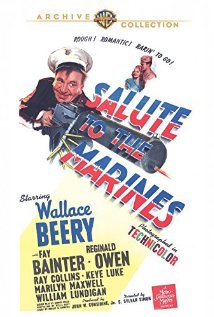
SALUTE TO THE MARINES
US, 1943, 101 minutes, Colour.
Wallace Beery, Fay Bainter, Reginald Owen, Ray Collins, Keye Luke, Marilyn Maxwell, William Lundigan, Donald Curtis.
Directed by S.Sylvan Simon.
Salute to the Marines is MGM’s war effort film, starring Wallace Beery and Fay Bainter, with solid support from Ray Collins, comic touches from Keye Luke, romance with Marilyn Maxwell and William Lundigan.
The main part of the action takes place in the Philippines in 1940, with the American presence, the prospect of Filipino independence from America in 1945. There is also the Japanese infiltration as well as German fifth columnists in the guise of promoters of peace.
The focus of the story is Wallace Beery, with one of his typical performances, as a 30 years Sgt major who trains Marines, wants action and some recognition. He is retired and does not go into action in other parts of Asia, stayes in the Philippines with his wife and daughter, faces the taunts of the Japanese, goes into action after Pearl Harbor, drawing on his skills, saving his daughter and the Filipinos, staying behind and being killed by the invading Japanese forces.
The film gets the MGM treatment, especially in colour, contrast to the black-and-white war effort films from Warner Bros. The film was directed by S. Sylvan Simon, who died at the age of 41, and made entertainment films, often supporting features such as the Whistling series, a Lassie film, and some action and adventures.
1. A film of its time? MGM and the war effort? Propaganda? Enlisting American morale, the condemnation of the Japanese?
2. MGM production values, superior to those of similar films from Warner Bros? Colour photography, sense of location in the Philippines, the cast, musical score? The sense of patriotism?
3. The title, the marching Marines, the ethos, officers, ordinary Marines, training, warfare? A sense of pride? The re-playing of the musical theme?
4. The end of training, 1943, the sense of the war, John Mason and the other officers, observation of training and tactics, for the Pacific? The ceremony, Mason telling the story about Bill Bailey?
5. The flashbacks to 1940, the situation of the war, America not involved, the Japanese Ambassador going to Washington, the Japanese deceit, the presence of the fifth columnist and Germans in the Philippines under the guise of conscientious objectors and campaigners for peace? The reality of December 7, 1941?
6. Wallace Beery, his screen persona, gruff, tough, the touches of humour? 30 years as Sgt major, his training the marines, discipline, not praising them to their face, yet pride in them? His being assigned to train civilians? The comic touches with the Filipinos, talking amongst themselves, the machetes rather than bayonets, the lack of discipline? Laughing at the Americans? Bailey and his exasperation, his assistants, the gradual weeks of training and improvement?
7. Flashy Logaz, as a Filipino, boxing, ambitions in the US, Bailey managing him? His assisting Bailey, presence with the Filipinos, support?
8. Bailey and his retirement, wanting action after 30 years, some medal or recognition? The news of the troops going to Asia, his hurrying back, the discussions with John Mason, neither of them going? Bailey and his retirement, the honour and the troop marching past?
9. Bailey and his wife, her joining the peace group, disdain of war, 30 years of marriage, love but her exasperation and embarrassment? Her being happy that he had retired?
10. The group, Caspar as leader, the doctor, the minister, religious services, the discussions about peace, turning the other cheek? The personalities involved? The children and Bailey enjoying playing with them?
11. Helen, devoted to her father, Rufus and James following her? John Mason as godfather? The supporting her father rather than her mother in the war effort? The scenes with the two men, the choice of Rufus? The finale and her being presented with her father’s medal?
12. The Japanese presence, the boat, the martial arts and Bailey and the Japanese throwing each other? His wife’s embarrassment?
13. December 7th, Rufus and James in the plane, the news about Pearl Harbor, firing at the aircraft, landing, going to help Bailey?
14. Caspar and his revealing himself as a Nazi, stirring the people, Flashy arguing against him, his leading people against the Americans?
15. The bridge, getting his daughter and the others across the bridge? Bailey and his uniform, with Flashy, the Marines and their putting dynamite on the
bridge, blowing it up? The guns, the firing, the machetes, the repelling of the Japanese? The arrival of American troops, planes?
16. Bailey, his death with his wife, the Filipinos, his men?
17. This kind of story being told in films in 1943, insights into the war, but morale-based?
Published in Movie Reviews
Published in
Movie Reviews
Tagged under
Saturday, 18 September 2021 19:55
Fighting Man of the Plains
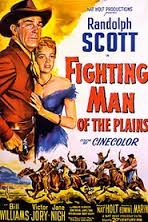
FIGHTING MAN OF THE PLAINS
US, 1949, 94 minutes, Colour.
Randolph Scott, Bill Williams, Victor Jory, Jane Nigh, Joan Taylor, Rhys Williams, Barry Kelley.
Directed by Edwin L.Marin.
Fighting Man of the Planes is an above average western, featuring Randolph Scott, one of the many westerns he made continuously from 1946 to 1962. It was directed by Edwin A. Marin, who directed Scott in a number of features.
The film is set in the post Civil War period, moving into the 1870s, images of raids during the Civil War, including Quantrell’s raid on Lawrence, Kansas, and the various outlaws in the succeeding years, including the Younger Brothers and Jesse James. Scott portrays another of these, Jim Dancer. He is seen killing a man in cold blood in Lawrence, but mistaking him for the man who killed his brother.
When he is arrested by a detective, circumstances enable him to escape and to do labouring work, and coming to a town where he is seen to be quick on the draw, the citizens of this newly respectable town ask him to be the sheriff. He is supported by the owner of the local saloon and his partner who is in love with Scott. There are difficulties when the actual killer of his brother and his gunslinger nominee the sheriff (Bill Williams) and build to a showdown – where a rider finally recognises Dancer and he is about to be lynched. He is rescued by Jesse James, a role which introduced Dale Robertson.
An above average western of the times.
1. Audience familiarity with the post Civil War period? The hostilities between North and South? The aftermath of the war, the outlaws, the bank robberies, the killings? The film somewhat idealising some of these outlaws, including Jesse James?
2. The background of the war? The Raiders? Lawless? The picture of the West, the town? The musical score?
3. Randolph Scott as Jim Dancer? From the South? His killing of the man in Lawrence, the niece witnessing it? Killing the wrong man? His activities after the war? His being arrested by the agent, going along with him, the agent wanting to cross the river, the ferry, the surge, the detective’s death, the arrival of David and the others, Dave freeing him, his going to do labouring work, his pay, in the town? The situation of violence, the threat the woman, the high noon situation, Dancer and his skills, the townspeople wanting him to be sheriff?
4. His work in the town, the letter of the law, trying to keep his identity hidden? The confrontations? Supported by Dave, Florence and her interest? Johnny Tancred and his cheekiness, violence?
5. Bailey, his dealings, crooked? Changing the laws in the town, especially the cattle going through the town? Johnny Tancred and his enforcement of the laws? Clash with Dancer?
6. The killings, the court case, the rider and his not being able to remember Dancer, his finally remembering in the court, the uproar, the role of the judge, Dancer and the people wanting to lynch him?
7. The previous visit of Jesse James, his riding in just as Dancer was to be killed? The rescue? The number of deaths, including Dave after his decision to move to New Orleans? The niece, her being upset with Dancer, attacking him? Florence and her regrets?
8. Typical story of the West, given a better treatment?
Published in Movie Reviews
Published in
Movie Reviews
Tagged under
Saturday, 18 September 2021 19:55
Sherlock Holmes and the Spiderwoman
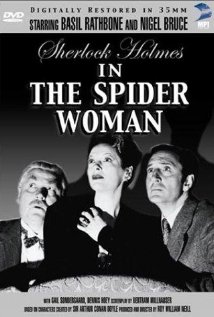
SHERLOCK HOLMES AND THE SPIDERWOMAN
US, 1944, 63 minutes, Black and white.
Basil Rathbone, Nigel Bruce, Gale Sondegaard, Dennis Hoey, Vernon Downing.
Directed by Roy William Neill.
The Spiderwoman draws on several details from Conan Doyle stories, The Speckled Band with the snake coming into the bedroom, and the story of Holmes dying in a river.
This is a well-paced story, just over an hour, with Holmes disappearing at first, reappearing with disguise, then passing himself off as an Indian gambler in order to entice the villain to contact him. He speculates that she is female and Andrea Spedding, played with sinister charm by Gale Sondegaard, comes to his rescue with the loan, but each soon realises that the other knows what is happening. There is an attempt on Holmes’ life with a deadly spider coming into his bedroom. He seeks out scientific information, only to find that the scientist they visit has murdered the real scientist and capitalises on his involvement with deadly spiders.
In a visit to Holmes flat, she is able to put some powder in the fireplace which is meant to kill Holmes and Watson – but it fails.
The story is neatly tied up as Holmes and Watson triumph again.
1. The popularity of Sherlock Holmes and Dr Watson series? The popularity of Basil Rathbone and Nigel Bruce?
2. The British settings, the 1940s, the satisfactory updating of Conan Doyle stories? Sense of character, investigations, locations? Musical score?
3. The opening, fishing in Scotland, Watson and his absentmindedness, the discussions about the suicides, the newspaper headlines? Holmes suggesting they were murder? People driven to suicide? His falling in the water, disappearance, presumed dead? The newspaper headlines? The crime spree? People regretting the absence of Sherlock Holmes?
4. Watson at Baker Street, the man posing as the postman, his insulting Holmes, Watson in high dudgeon? The revelation? The visit of inspector Lestrade and Watson giving him the souvenir of the pipe?
5. Holmes and his theories, that the villain was female? His pretending to be an Indian gambler, at the casino, the approach by Andrea Spedding, plausible talk, his pretending to have lost his money, her arrangement of a loan? His gratitude?
6. Andrea Spedding and character, personality, reliance on her brother? The visit by Holmes, her seeing through him? Giving the money back to him?
7. Lestrade, Watson, Holmes asleep, the spider coming, Holmes killing it? The pursuit of the criminal, his being shot? Norman Locke and his escaping?
8. The visit of the scientist and Watson thinking the fake and pulling his beard? The recommendation to visit the research, going by train, the visit, the fake scientist and his attempt to kill?
9. The visit by Miss Spedding, the nephew, his misbehaving? The double angled talk between Holmes and Miss Spedding? Watson being overcome by fumes? Homes? Opening the window? The little boy having put the material in the fireplace?
10. The build-up to the confrontation, the discovery of the dwarf, his being in the box?
11. Miss Spedding, the departure, her being presented as an arch criminal in the vein of Moriarty?
12. Holmes, the skill of his investigations, his use of disguises, elementary? And Watson’s response?
Published in Movie Reviews
Published in
Movie Reviews
Tagged under